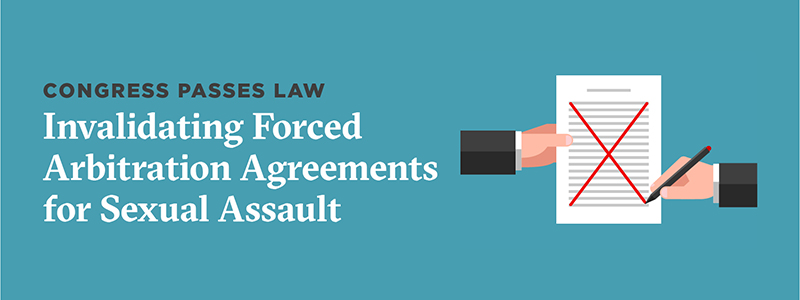
By Janell Stanton
Who said bipartisanship was dead? In a rare display of bipartisanship, the House and Senate passed, and President Biden signed into law, the “Ending Forced Arbitration of Sexual Assault and Sexual Harassment Act of 2021” (H.R. 4445).
Passing legislation banning pre-dispute arbitration agreements in the employment context had become a focal point of legislators in the #MeToo era. Forced arbitration agreements seemingly disproportionately benefitted businesses because arbitration is generally less likely to invite public scrutiny without public court filings, as well as have lower overall awards. At the same time, studies have shown that forced arbitration can have a chilling effect on sexual harassment claims. Indeed, the legislature has historically introduced several bills aimed at curbing arbitration agreements in the employment context.
Most notably, Congress introduced the Forced Arbitration Injustice Repeal (“FAIR”) Act in 2019. The FAIR Act, as written, is much broader than H.R. 4445 and would ban pre-dispute arbitration agreements forcing arbitration of employment, consumer, antitrust, or civil rights disputes. However, while the bill passed the House of Representatives, it failed to pass the Senate, though it was reintroduced in the Senate in March 2021. Whether the Senate can muster the bipartisan support needed to pass this broader arbitration prohibition is uncertain.
States have also attempted to put limits on pre-suit arbitration agreements, with varying degrees of success. Most will face a major legal hurdle; namely, that “the Federal Arbitration Act (“FAA”) preempts any state rule discriminating on its face against arbitration.” Kindred Nursing Centers Ltd. P’ship v. Clark, 137 S. Ct. 1421, 1426, 197 L. Ed. 2d 806 (2017). For example, California enacted a law banning pre-dispute arbitration agreements in the employment context: California Labor Code § 432.6. Prior to the law’s effective date, though, a federal judge from the Eastern District of California ordered an injunction, finding that the law was preempted by the FAA because it “single[d] out arbitration.” Chamber of Com. of United States v. Becerra, 438 F. Supp. 3d 1078, 1096 (E.D. Cal. 2020).
Ninth Circuit Decision
On September 15, 2021, a three-judge panel from the Ninth Circuit Court of Appeals voted 2-1 to reverse, in part, the district court’s injunction. Chamber of Com. of United States v. Bonta, 13 F.4th 766 (9th Cir. 2021). The panel found that Labor Code § 432.6 is not preempted by the FAA because the FAA deals with “enforcement and validity of consensual written agreements to arbitrate” whereas California’s law mandates that arbitration agreements be consensual, and that employees be free from retaliation for refusing to sign. Id. at 778. The Chamber has filed a Petition for Rehearing en banc, so the final fate of California’s law remains in flux.
Importantly, the California Arbitration Act and the standards developed in the landmark case Armendariz v. Foundation Health Psychcare Services, Inc., 24 Cal. 4th 83, 6 P.3d 669 (Cal. 2000) continue to provide California employees a measure of protection against unconscionable arbitration agreements that has withstood Supreme Court scrutiny. See Ramos v. Superior Court, 28 Cal. App. 5th 1042, 239 Cal. Rptr. 3d 679 (Cal. Ct. App. 2018), cert. denied, 140 S. Ct. 108, 205 L. Ed. 2d 33 (2019).
New York’s law fared worse. In 2018, New York enacted “sweeping legislation [to] deal with the scourge of sexual harassment.” N.Y. State Senate, Stenographic Rec., 241st Leg., Reg. Sess., at 1855 (Mar. 30, 2018). As part of that legislation, New York banned agreements to arbitrate claims of sexual harassment. N.Y. C.P.L.R. 7515. Mahmoud Latif filed a lawsuit against his former employer, Morgan Stanley, asserting several claims, including for sexual harassment and aggravated sexual abuse. Latif v. Morgan Stanley & Co. LLC, No. 18CV11528 (DLC), 2019 WL 2610985, at *1 (S.D.N.Y. June 26, 2019). Morgan Stanley moved to compel arbitration of Latif’s claims pursuant to the company’s arbitration agreement which Latif signed off on as part of his offer letter. Id. In granting Morgan Stanley’s motion to compel arbitration, the court found that § 7515 conflicts with the FAA and that a “state law prohibit[ing] outright the arbitration of a particular type of claim . . . is displaced by the FAA.” Id. at *3 (quoting AT&T Mobility LLC v. Concepcion, 563 U.S. 333, 341 (2011)) (internal quotations omitted).
Accordingly, to put limits on pre-suit arbitration agreements that pass constitutional muster, the dictate needed to come from Congress.
Accordingly, to put limits on pre-suit arbitration agreements that pass constitutional muster, the dictate needed to come from Congress. To pass Congress, though, both sides needed to strike a compromise, balancing business interests and an employee’s right to seek redress in the courts. Thus, rather than enacting a general ban on forced arbitration agreements as in the FAIR Act, H.R. 4445 amends the FAA to invalidate pre-dispute arbitration agreements and pre-dispute joint-action waivers involving only claims of sexual harassment and sexual assault. Specifically, Section 402(a) of the law provides that:
Notwithstanding any other provision of this title, at the election of the person alleging conduct constituting a sexual harassment dispute or sexual assault dispute, or the named representative of a class or in a collective action alleging such conduct, no pre-dispute arbitration agreement or pre-dispute joint-action waiver shall be valid or enforceable with respect to a case which is filed under Federal, Tribal, or State law and relates to the sexual assault dispute or the sexual harassment dispute.
The law also requires that determinations about the applicability of the law to arbitration agreements would be decided by the courts, not an arbitrator. As written, the law applies to “any dispute or claim that arises or accrues on or after the date of enactment of this Act.”
After H.R. 4445
Effectively, arbitration agreements requiring an individual to arbitrate a future claim of sexual assault or sexual harassment are unenforceable if they accrue after H.R. 4445 was signed into law on March 3, 2022. Likewise, agreements requiring individuals to proactively waive their right to participate in a joint, class, or collective action of a future sexual assault or sexual harassment claim are also unenforceable. Under H.R. 4445, aggrieved parties would have the ability to choose whether to arbitrate their claims or file a lawsuit in court.
To be clear, this law is limited to disputes involving claims of sexual assault or sexual harassment. The H.R. 4445 defines sexual assault and sexual harassment broadly, and both definitions encompass actions constituting sexual assault and sexual harassment under federal, tribal, or state law:
Sexual Assault Dispute means a dispute involving a nonconsensual sexual act or sexual contact, as such terms are defined in section 2246 of title 18 or similar applicable tribal or state law, including when the victim lacks capacity to consent.
Sexual Harassment Dispute means a dispute relating to conduct that is alleged to constitute sexual harassment under applicable Federal, Tribal, or State law.
What remains to be seen, and likely litigated, is how H.R. 4445’s edicts will impact a lawsuit asserting claims of sexual harassment or sexual assault in addition to other claims.
What remains to be seen, and likely litigated, is how H.R. 4445’s edicts will impact a lawsuit asserting claims of sexual harassment or sexual assault in addition to other claims. The language of H.R. 4445 bans pre-dispute arbitration and joint-action waivers “with respect to a case” not with respect to a claim. Presumably, parties alleging sexual harassment or assault claims will argue the legislature’s use of the word “case” rather than “claim” was intentional, thereby allowing the plaintiff to choose whether all claims in a particular case are handled by a court or an arbitrator. With respect to the joint action waiver provisions of H.R. 4445, courts will be left to determine how class members who do not assert sexual harassment or assault claims will be handled.
Now that H.R. 4445 has been signed into law, employers and their counsel should be aware that portions of arbitration agreements signed after March 3, 2022, may be unenforceable. While employers are barred from entering into these types of agreements, H.R. 4445 provides that employees cannot be compelled to pursue their claims in arbitration. Instead, H.R. 4445 permits employees to choose whether to pursue arbitration or to file their action in court. Other types of employment claims may still be subject to mandatory arbitration and joint-action waivers, but H.R. 4445 makes clear that they cannot be enforced against claims of sexual assault and sexual harassment.
Employers and their counsel should stay apprised of this quickly developing area of law and be prepared to modify agreements and advise their clients accordingly.
 Janell Stanton
Janell Stanton
jstanton@wfjlawfirm.com
Janell Stanton is a senior associate at Wagner, Falconer & Judd. She focuses her practice on management-side employment law, employment litigation, and corporate law. Janell advises management on strategies, methods, and policies designed to maintain compliance with federal, state, and local laws and minimize risk and exposure to potential litigation.